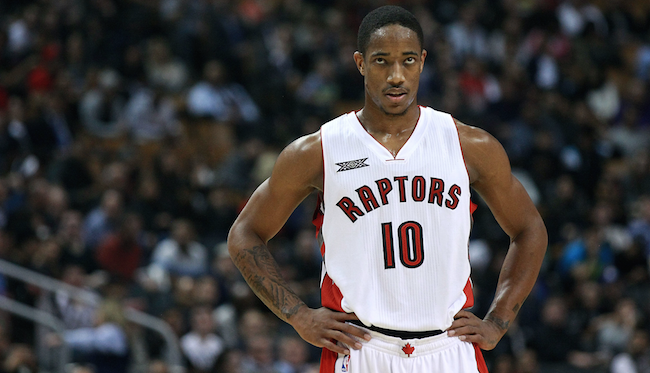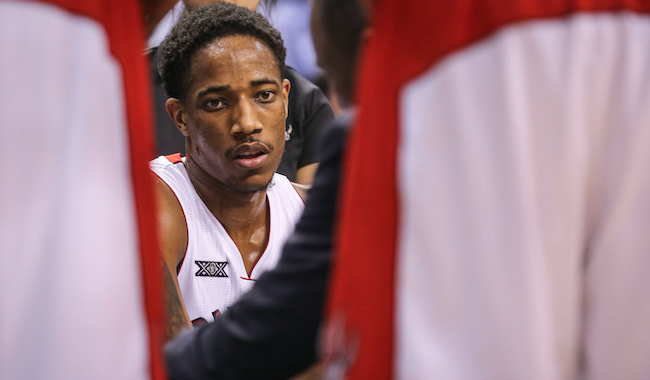
In late June, Masai Ujiri said his team was “open for business.” The Toronto Raptors were less than eight weeks removed from a disastrous and completely humbling first-round sweep by the hands of the Washington Wizards. The draft was 48 hours away, and free agency just over a week from beginning. The offseason was nearing full swing, basically, and the Raptors’ chief decision-maker wanted to make clear that they wouldn’t stand idly by and watch it from the sidelines.
But the blockbuster move for which the über-aggressive Ujiri has become notorious never quite materialized this summer. Toronto acquired a protected first-rounder from the Milwaukee Bucks on draft night in exchange for Greivis Vasquez, and took combo guard Delon Wright with the 20th pick. It signed DeMarre Carroll to a contract – four years, $60 million – that some deemed an overpay on July 1, then quickly did the same with local native Cory Joseph. Bismack Biyombo and Luis Scola were later brought in on extremely reasonable deals to fill the frontcourt void left by the departed Amir Johnson and Tyler Hansbrough.
Collectively, those moves should be considered nothing less than solid. Carroll is the versatile ‘3-and-D’ type who can help fix what ailed the Raptors on both ends of the floor last season, and the team’s subsequent additions have a similar goal in mind, too. But where was the major shakeup Ujiri seemed to suggest was coming in June?
Patience is key in the NBA. Toronto’s dismal playoff performance certainly exposed the limits of Dwane Casey’s team as currently constructed, and will render any regular season success to come as nothing more than a tease. Barring major internal improvement that seems unlikely, the Raptors appear firmly on a level all their own when it comes to Eastern Conference contention – lagging behind the Wizards and Chicago Bulls, farther still from the Atlanta Hawks, and nowhere close to the Cleveland Cavaliers.
But it’s entirely necessary for some teams to wade in those waters. Toronto has limited means of unique flexibility going forward, and several important decisions to make regarding members of its perceived core – a process Ujiri began by inking Jonas Valanciunas to a four-year, $64 million extension last month.
The Raptors’ starting center is still somewhat of an unknown at 23 years old. Casey kept him on the bench for a majority of crunch-time minutes in 2014-15, and his natural two-way ethos clashes with Toronto’s schemes on both ends of the floor. Still, there’s immense value to be gleaned from possessing a talent like Valanciunas on a reasonable contract; if Toronto isn’t his long-term home, Ujiri will find the Lithuanian behemoth his next one by netting a substantial trade package in return for doing so.
DeMar DeRozan’s future is less certain, which vexes on the surface considering his status as one of basketball’s best wings. As the salary cap skyrockets to a projected $90 million for 2016-17, the former All-Star will likely be an unrestricted free agent next July unless he signs his own extension with the Raptors this season – something Ujiri says definitely won’t be happening.
Here’s Toronto’s GM on the matter, courtesy of Sportsnet’s “Free Association” podcast.
“There will be no extension talks with DeMar [before the end of the 2015-16 season],” Ujiri told Free Association. “He can only extend for a certain amount of money and I just foresee that DeMar sees himself- and we see him- as more than that type of a player. So I think DeMar is going to wait to see how it goes this year and do the best deal for himself, and we’ll do the best deal for ourselves, too.”
As Ujiri suggests, both DeRozan and the Raptors have incentive to curb contract talks until next summer.
The 2014 All-Star is expected to decline his $10.5 million player option for next season and become a free agent in July. DeRozan would no doubt receive an average salary of far more than that in a potential extension with Toronto, but with that route comes limits in terms of maximum years and money allowable that the open market doesn’t. In terms of security and earning potential, an extension just doesn’t make sense for the vast majority of players near the 26-year-old’s ability.
The Raptors’ perspective is similar. After an injury-plagued 2014-15 marked by a career-low 41.3 field goal percentage and regression from high-water marks in both three-point and free throw rates, DeRozan isn’t quite worth the max-level contract he’d undoubtedly seek in an extension. And if Ujiri and company were fully confident their star wing would eventually live up to that deal, it would obviously be most prudent to lock him up on the five-year contract that only incumbent teams can offer in unrestricted free agency.
It’s absolutely unsurprising that Toronto and DeRozan won’t even consider an extension. But that won’t stop some casual fans from wondering if this news means the sides are destined to part ways some 10 months from now – a prospect that could actually still come to fruition despite that misunderstanding.

There was a time in 2014-15 when the Raptors were the surprise of the league.
Casey’s team was 24-7 in late December, withstanding DeRozan’s ongoing absence to stay at the top of the East. Kyle Lowry was garnering legitimate MVP buzz with his backcourt mate sidelined, spearheading a unique and utterly dominant offense that made up for leaky play on the other end. But that combination would prove unsustainable. Toronto’s isolation-heavy, free throw-dependent offense tailed off despite the return of DeRozan a few weeks later, and its defense grew incrementally worse by the month. The Raptors went just 13-16 after the All-Star break, setting the stage for that dispiriting first-round effort against Washington that should not have been hard to see coming.
In the span of less than five months, Toronto went from a legitimate Finals contender to the league’s laughingstock. That’s how quickly fortunes can turn in the NBA, though, especially for teams whose true caliber lies somewhere between decidedly mediocre and legitimately good. The question Ujiri must ask himself when it comes to a potential deal for DeRozan is two-fold: Is he the type of player who can propel the Raptors past their perceived peak? And if not, what are the chances Toronto can acquire another star to help him do it?
Answers for teams that don’t have the luxury of that rare franchise-altering cornerstone never come easy. Ujiri won’t only make them based on what he sees from DeRozan and his teammates in 2015-16, but also what he believes he might see from them going forward. And unfortunately, foresight isn’t anything close to 20/20. If it were, the fate of DeRozan’s tenure with the Raptors would already be decided – one way or another.
[Via Sportsnet]






